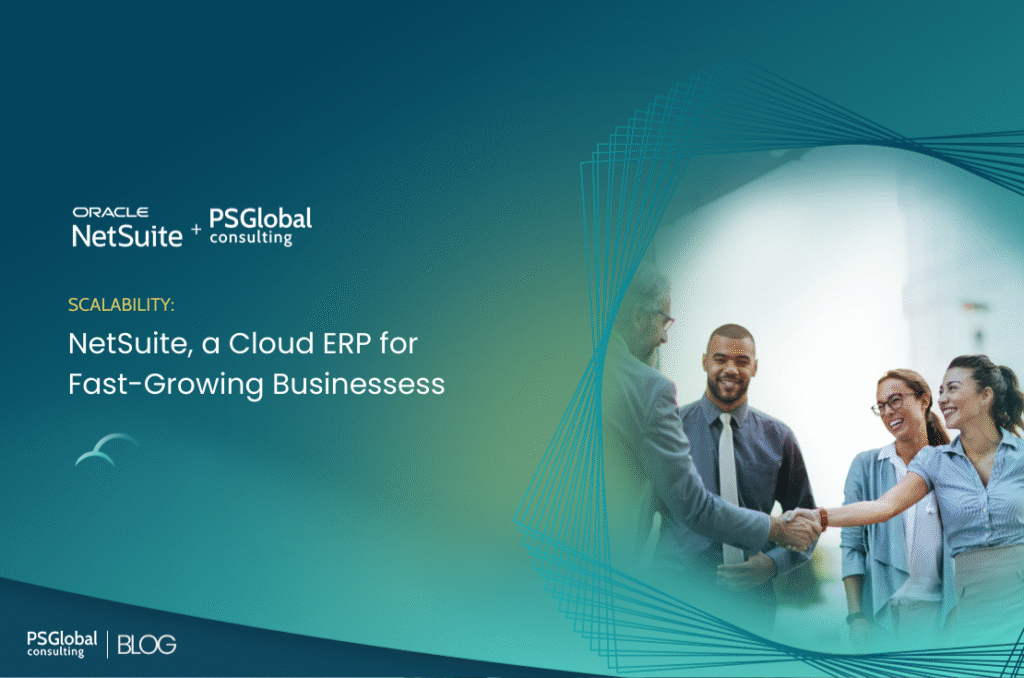Introduction
Overview of Oracle NetSuite and its significance in the cloud ERP landscape
The Oracle NetSuite cloud enterprise resource planning (ERP) system is one of the first cloud-based ERP1 systems, and is often acknowledged as a pioneer in the ERP market. NetSuite’s unified platform eliminates the limitations of traditional on-premises ERP systems. The significance of Oracle NetSuite extends beyond its technological capabilities, as it also represents a fundamental shift toward flexible, accessible, and scalable business management solutions that adapt to the evolving needs of modern enterprises.
NetSuite’s cloud ERP solution offers businesses the ability to access real-time business data from anywhere, providing unprecedented visibility into core business operations. Unlike traditional on-premises ERP systems that require significant infrastructure investments and ongoing maintenance, NetSuite’s cloud-based approach delivers enterprise-level functionality through a subscription model that scales with business growth. This accessibility has made NetSuite especially beneficial for growing businesses that need robust ERP capabilities without the complexity and cost barriers typically associated with enterprise software implementations.
Importance of scalability for fast-growing businesses
Scalability represents one of the most critical factors for businesses that are rapidly expanding or planning for future growth. Growing businesses face unique challenges as they transition from startup operations to established enterprises, requiring systems that can accommodate increasing transaction volumes, expanding user bases, and evolving business requirements without compromising performance or reliability. The right ERP system must provide a foundation that supports business growth rather than constraining it through technical limitations or inflexible architectures.
Fast-growing companies often struggle with systems that worked well in their early stages but become bottlenecks as business operations expand. Traditional business applications and disparate systems create inefficiencies that compound as organisations grow, leading to data silos, process inconsistencies, and operational challenges that can hinder business performance. Scalable ERP solutions address these challenges by providing integrated platforms that grow alongside the business, ensuring that core business functions remain efficient and effective regardless of organisational size or complexity.
Understanding ERP and Its Role in Business Growth
Definition of ERP and its components
Enterprise resource planning (ERP) systems serve as comprehensive business management solutions that integrate various business functions into a unified platform. An ERP system encompasses multiple modules and components to streamline business processes across departments, from financial and human resources to supply chain and customer relationship management (CRM). These integrated systems eliminate data silos by creating a centralised database that allows different business units to share information seamlessly, improving collaboration and decision-making across the organisation.
The core components of modern ERP systems include financial management modules for accounting and reporting, inventory management capabilities for supply chain optimisation, CRM tools for sales and service operations, and human capital management features for workforce administration. Cloud ERP solutions like NetSuite extend these traditional components with advanced analytics, real-time reporting, and mobile accessibility, providing businesses with comprehensive visibility into their operations while maintaining the flexibility to adapt to changing business needs.
How Cloud ERP systems support business processes
Cloud ERP systems support business processes by providing standardised workflows, automated procedures, and real-time data integration across all organisational functions. These systems eliminate manual processes and reduce the risk of errors by automating routine tasks such as order processing, inventory updates, and financial reconciliations. By standardising business processes within a unified platform, cloud ERP solutions ensure consistency in operations while providing the flexibility to customise workflows according to specific business requirements.
The integration capabilities of ERP systems allow businesses to maintain accurate, up-to-date information across all departments, enabling better coordination and faster decision-making. When sales teams input new orders, for example, the ERP system automatically updates inventory levels, triggers fulfilment processes, and generates financial records, ensuring that all relevant departments have immediate access to current information. This level of integration becomes increasingly valuable as businesses grow and the complexity of their operations increases.
Key features of cloud-based ERP solutions
Cloud-based ERP solutions offer distinct advantages over traditional on-premises systems, providing businesses with greater flexibility, accessibility, and cost-effectiveness. Key features include automatic software updates that ensure businesses always have access to the latest functionality without manual intervention, scalable infrastructure that adjusts to changing demand, and multi-tenant architectures that deliver enterprise-grade capabilities at lower costs. These cloud systems also provide enhanced security through professional data centres and disaster recovery capabilities that many businesses cannot achieve with on-premises infrastructure.
The accessibility of cloud ERP software enables remote work and multi-location operations, allowing authorised users to access business data and applications from any device with internet connectivity. This flexibility has become increasingly important as businesses adopt distributed work models and expand into new geographic markets. Additionally, cloud-based ERP solutions typically offer faster implementation times and lower upfront costs compared to traditional systems, making enterprise-level functionality accessible to small to medium-sized businesses that previously could not justify the investment in comprehensive ERP capabilities.
NetSuite: A Comprehensive Cloud ERP Solution
Introduction to Oracle NetSuite
Oracle NetSuite represents a mature and comprehensive cloud ERP platform that has been specifically designed to help businesses manage their operations efficiently while providing the scalability needed for growth. As part of Oracle’s enterprise software portfolio, NetSuite combines the innovation and agility of a cloud-native solution with the reliability and support of an established technology leader. NetSuite is designed to serve businesses of all sizes, from small startups to large enterprises, providing a unified platform that eliminates the need for multiple disparate systems.
The evolution of NetSuite from a pure-play cloud company to an Oracle subsidiary has enhanced its capabilities while maintaining its focus on accessibility and user experience. NetSuite provides businesses with a complete suite of applications that can be implemented quickly and scaled gradually, allowing organisations to start with core functionalities and add modules as their needs evolve. This approach makes NetSuite particularly attractive to growing businesses that need immediate ERP capabilities but want to avoid the complexity and cost of traditional enterprise implementations.
Overview of NetSuite ERP functionalities
NetSuite offers comprehensive ERP functionalities that span all critical business processes, providing integrated solutions for financial management, CRM, e-commerce, inventory management, and business intelligence. The platform’s financial management capabilities include general ledger, accounts payable and receivable, budgeting and planning, and multi-currency support, enabling businesses to maintain accurate financial records while supporting global operations. NetSuite’s CRM functionality integrates seamlessly with other business processes, providing sales teams with complete visibility into customer interactions, order history, and support cases.
The inventory management features within NetSuite help businesses optimise their supply chain operations through real-time inventory tracking, automated reorder points, and demand planning capabilities. E-commerce integration allows businesses to manage online sales channels directly within the ERP system, ensuring that web orders are automatically processed and fulfilled without manual intervention. NetSuite also provides robust reporting and analytics tools that transform raw business data into actionable insights, helping decision-makers understand trends, identify opportunities, and address challenges proactively.
Benefits of using a cloud-based ERP system
Cloud-based ERP systems like NetSuite offer numerous advantages that make them particularly suitable for growing businesses. The subscription-based pricing model eliminates large upfront capital expenditures, allowing businesses to invest their resources in growth initiatives rather than infrastructure. Automatic updates ensure that businesses always have access to the latest features and security enhancements without the need for costly upgrade projects or system downtime. Cloud infrastructure’s scalable nature means businesses can increase or decrease their usage based on actual needs, providing cost flexibility that traditional systems cannot match.
The accessibility and mobility provided by cloud ERP solutions enable businesses to operate more efficiently in today’s distributed work environment. Employees can access business applications and data from any location, supporting remote work arrangements and enabling businesses to hire talent regardless of geographic location. Additionally, cloud-based systems typically offer superior disaster recovery and business continuity capabilities, as data is automatically backed up and stored in multiple locations with professional-grade security measures that exceed what most businesses can implement independently.
Scalability and Fast-Growing Businesses
Definition of scalability in the context of ERP
Scalability in ERP systems refers to the platform’s ability to accommodate growth in users, transactions, data volume, and business complexity without degrading performance or requiring significant system changes. A truly scalable ERP solution can handle increased workload through additional resources rather than architectural limitations, ensuring that business operations remain efficient as organisations expand. This scalability encompasses technical aspects, such as processing power and storage capacity, and functional aspects, such as adding new users, locations, or business processes without disrupting existing operations.
For growing businesses, ERP scalability means the difference between a system that supports expansion and one that becomes a constraint on growth. Scalable ERP platforms like NetSuite are designed with multi-tenant architectures that allow resources to be allocated dynamically based on demand, ensuring consistent performance regardless of usage patterns. This approach contrasts with traditional on-premises systems that often require hardware upgrades, software modifications, or complete system replacements to accommodate growth, creating significant costs and operational disruptions for expanding businesses.
How NetSuite enables businesses to scale without limitations
NetSuite enables businesses to scale without limitations through its cloud-native architecture, flexible licensing model, and comprehensive functionality that grows with organisational needs. The platform’s multi-tenant design allows businesses to add users, increase transaction volumes, and expand into new markets without worrying about technical constraints or infrastructure limitations. NetSuite’s modular approach means businesses can start with core ERP functionality and gradually add specialised features such as advanced manufacturing, professional services automation, or industry-specific capabilities as their requirements evolve.
The global capabilities built into NetSuite support international expansion by providing multi-currency support, localised tax calculations, and country-specific reporting requirements. Businesses can establish new subsidiaries or branches within the same NetSuite instance, maintaining centralised visibility while accommodating local operational requirements. NetSuite also provides API integration capabilities that allow businesses to connect with third-party applications and services, ensuring that the ERP system can adapt to changing technology landscapes and specialised business requirements without requiring complete system replacements.
Case studies of companies that have successfully scaled with NetSuite
Numerous companies across various industries have successfully scaled their operations using NetSuite as their foundation for growth. Technology companies have leveraged NetSuite’s flexibility to support rapid product development cycles and global market expansion, while retail businesses have used the platform’s e-commerce integration to manage multi-channel operations seamlessly. Manufacturing companies have benefited from NetSuite’s supply chain management capabilities to optimise operations as they expand their product lines and customer base.
These success stories demonstrate NetSuite’s ability to support diverse business models and growth patterns, from organic expansion to acquisition-driven growth strategies. Companies that have grown from small startups to significant enterprises while using NetSuite consistently report that the platform’s scalability eliminated the need for costly ERP replacements that often derail growth momentum. The flexibility of NetSuite has allowed these businesses to adapt their systems to changing market conditions, regulatory requirements, and operational needs without the disruption typically associated with major system changes.
Real-Time Data and Analytics for Informed Decision Making
Importance of real-time visibility in business operations
Real-time visibility into business operations has become a critical success factor for organisations operating in today’s fast-paced business environment. Access to real-time business data enables decision-makers to respond quickly to market changes, operational challenges, and growth opportunities, providing competitive advantages that can be decisive in dynamic markets. Real-time visibility eliminates the delays and inaccuracies associated with manual reporting processes, ensuring that management has current information when making strategic and operational decisions.
For growing businesses, real-time visibility becomes even more crucial as the complexity of operations increases and the margin for error decreases. Traditional reporting methods that rely on periodic data compilation can miss critical trends or issues until they become significant problems, potentially impacting business performance or customer satisfaction. Real-time data access allows businesses to identify and address issues proactively, optimise operations continuously, and capitalise on emerging opportunities before competitors can respond.
How NetSuite’s analytics and reporting tools improve business performance
NetSuite’s analytics and reporting tools improve business performance by transforming raw operational data into actionable insights that drive better decision-making across all organisational levels. The platform provides pre-built reports and dashboards that address common business requirements while offering customisation capabilities that allow businesses to focus on metrics most relevant to their specific operations and objectives. These tools integrate data from all business functions, providing comprehensive views that eliminate the blind spots often created by disparate systems.
The real-time nature of NetSuite’s reporting capabilities means that businesses can monitor key performance indicators continuously rather than waiting for periodic reports. This immediate access to current information enables proactive management approaches that can prevent problems before they impact operations or customer satisfaction. NetSuite’s analytics tools also provide trend analysis and forecasting capabilities that help businesses plan for future growth and identify potential challenges before they become critical issues.
Utilising customisable dashboards for greater visibility
NetSuite’s customizable dashboards provide businesses with personalised views of their operations, allowing different users to focus on the information most relevant to their roles and responsibilities. Sales managers can create dashboards that highlight pipeline activities, conversion rates, and customer interactions, while financial managers can focus on cash flow, profitability, and budget performance. These customised views ensure that each user has immediate access to the information they need to perform their duties effectively without being overwhelmed by irrelevant data.
The flexibility of NetSuite’s dashboard capabilities allows businesses to adapt their reporting views as they grow and their needs evolve. New metrics can be added, existing displays can be modified, and access permissions can be adjusted to accommodate organisational changes and new business requirements. This adaptability ensures that the ERP system’s reporting capabilities remain aligned with business needs over time, providing consistent value as operations become more sophisticated and complex.
Streamlining Business Processes with NetSuite
How NetSuite unifies various business functions
NetSuite unifies various business functions by providing a single platform that integrates all critical business processes, eliminating the silos and inefficiencies created by disparate systems. This unification allows businesses to streamline their operations by ensuring that information flows seamlessly between departments, reducing manual data entry, minimising errors, and improving overall operational efficiency. When customer service representatives access a customer record, for example, they can immediately see sales history, support interactions, billing information, and order status without switching between multiple systems.
The unified approach of NetSuite extends beyond basic data sharing to include process integration, where actions in one business function automatically trigger related processes in other areas. Order entry can automatically update inventory levels, generate shipping requirements, create billing records, and update customer communications, ensuring that all relevant business functions are coordinated and current. This level of integration becomes increasingly valuable as businesses grow and the volume of transactions and complexity of operations increase.
Enhancing operational efficiency through automation
NetSuite enhances operational efficiency through comprehensive automation capabilities that eliminate manual processes, reduce the risk of errors, and free up staff to focus on value-added activities. Automated workflows can handle routine tasks such as order processing, invoice generation, payment processing, and inventory management, ensuring that these critical processes are completed accurately and consistently without manual intervention. This automation not only improves efficiency but also provides better customer service by reducing processing times and eliminating human errors.
The automation capabilities within NetSuite can be customised to match specific business requirements and can evolve as business processes become more sophisticated. Businesses can start with basic automation for core processes and gradually add more complex workflows as they identify opportunities for improvement. This flexibility allows growing businesses to continuously optimise their operations without requiring major system changes or disruptions to existing processes.
Real-world examples of streamlined workflows
Real-world implementations of NetSuite demonstrate the significant efficiency gains possible through streamlined workflows and integrated business processes. E-commerce businesses have used NetSuite to create fully automated order-to-cash processes that handle everything from online order capture to shipping and billing without manual intervention. Manufacturing companies have implemented automated procurement processes that monitor inventory levels, generate purchase orders, and track deliveries while keeping all stakeholders informed throughout the process.
Service businesses have leveraged NetSuite’s project management and time tracking capabilities to automate billing processes, ensuring that client work is accurately captured and billed promptly. These automated workflows not only improve efficiency but also provide better visibility into business operations, allowing managers to identify bottlenecks, optimise resource allocation, and improve overall business performance through data-driven decision-making.
Financial Management and Reporting
Overview of NetSuite’s financial management capabilities
NetSuite’s financial management capabilities provide businesses with comprehensive tools for managing all aspects of their financial operations, from basic accounting functions to advanced financial planning and analysis. The platform includes a complete general ledger system with multi-currency support, accounts payable and receivable management, fixed asset tracking, and budgeting and planning tools. These integrated financial management features ensure that businesses maintain accurate financial records while providing the flexibility to support complex organisational structures and international operations.
The real-time nature of NetSuite’s financial management system means that financial information is always current, eliminating the month-end closing delays that often characterise traditional accounting systems. Transactions are automatically recorded and reflected in financial reports immediately, providing management with up-to-date visibility into financial performance. This real-time capability is particularly valuable for growing businesses that need to monitor cash flow closely and make rapid decisions based on current financial position.
Importance of accurate financial reporting for growth
Accurate financial reporting serves as the foundation for informed business decisions and is essential for businesses seeking growth capital or planning expansion strategies. Investors, lenders, and other stakeholders require reliable financial information to assess business performance and potential, making accurate reporting a critical capability for growing businesses. NetSuite’s integrated approach ensures that financial data is consistent across all business functions, eliminating discrepancies that can undermine confidence in reported results.
Beyond external reporting requirements, accurate financial information enables internal management to identify trends, optimise operations, and allocate resources effectively. Growing businesses need to understand which products, services, or markets generate the highest returns so they can focus their expansion efforts appropriately. NetSuite’s financial reporting capabilities provide the detailed analysis needed to make these strategic decisions while maintaining the accuracy and reliability required for regulatory compliance and stakeholder communications.
How businesses use NetSuite to manage their financials
Businesses use NetSuite to manage their financials through integrated workflows that connect financial processes with operational activities, ensuring that financial records reflect actual business performance accurately and immediately. Sales transactions automatically update revenue recognition schedules, purchase orders flow through approval workflows before creating financial commitments, and expense reports integrate with accounts payable to ensure complete expense tracking. This integration eliminates the manual processes that often create delays and errors in traditional financial management systems.
NetSuite’s financial management capabilities also support complex business structures through features such as inter-company transactions, consolidation reporting, and multi-subsidiary management. Growing businesses often need to manage multiple entities, locations, or business units, and NetSuite provides the tools to maintain separate financial records while creating consolidated reports for overall business analysis. This flexibility allows businesses to expand their organisational structure without compromising financial visibility or control.
Customer Relationship Management with NetSuite
Role of CRM in supporting business growth
CRM plays a crucial role in supporting business growth by providing the tools and insights needed to attract new customers, retain existing ones, and maximise the value of customer relationships over time. Effective CRM systems help businesses understand customer needs, preferences, and behaviours, enabling more targeted marketing efforts, better customer service, and increased sales effectiveness. For growing businesses, CRM capabilities become essential as customer bases expand and personal relationships become harder to maintain without systematic support.
NetSuite’s integrated CRM functionality provides businesses with complete visibility into customer interactions across all touchpoints, from initial marketing contacts through sales processes and ongoing support relationships. This comprehensive view enables businesses to deliver consistent customer experiences while identifying opportunities for growth within existing accounts. The integration between CRM and other business functions also ensures that customer-facing teams have access to complete information about orders, billing, support history, and other relevant details that can impact customer satisfaction and loyalty.
How NetSuite integrates CRM with ERP for better customer experiences
NetSuite’s integration of CRM with ERP capabilities creates a unified platform that provides customer-facing teams with complete visibility into all aspects of customer relationships, from initial prospects through ongoing accounts. Sales representatives can access real-time information about product availability, pricing, delivery schedules, and account status during customer interactions, enabling them to provide accurate information and make commitments they can fulfil. This integration eliminates the communication gaps and delays that often occur when CRM and ERP systems operate independently.
The unified data model in NetSuite ensures that customer information is consistent across all business functions, preventing the discrepancies that can create customer service issues and operational inefficiencies. When customers contact support with questions about orders, billing, or product issues, service representatives have immediate access to the complete account history and can resolve issues quickly without transferring calls or requesting additional information. This seamless customer experience becomes increasingly important as businesses grow and customer expectations continue to rise.
Benefits of unified data for decision-makers
Unified customer data provides decision-makers with comprehensive insights into customer behaviour, preferences, and profitability that enable more effective strategic planning and resource allocation. Management can analyse customer acquisition costs, lifetime value, and retention rates across different segments, markets, or products to identify the most profitable growth opportunities. This unified view also enables businesses to identify at-risk customers early and implement retention strategies before relationships are damaged.
The integration of customer data with operational and financial information in NetSuite allows businesses to understand the complete impact of customer relationships on business performance. Decision-makers can see how customer preferences drive inventory requirements, how service issues impact profitability, and how sales activities translate into financial results. This comprehensive visibility enables more informed decisions about product development, market expansion, and customer service investments that support sustainable business growth.
Future Growth and Evolving Business Needs
How NetSuite supports companies looking to expand globally
NetSuite supports global expansion through comprehensive international capabilities that address the complex requirements of multi-country operations. The platform provides native multi-currency support, localised tax calculations, country-specific reporting formats, and language localisation features that enable businesses to operate in new markets without requiring separate systems or extensive customisation. These built-in global capabilities allow businesses to establish international operations quickly while maintaining centralised visibility and control over worldwide activities.
The scalable architecture of NetSuite means that businesses can add new countries, currencies, and subsidiaries without impacting existing operations or requiring major system modifications. This flexibility is particularly valuable for growing businesses that may not know exactly how their international expansion will evolve but need a platform that can adapt to changing requirements. NetSuite’s cloud-based delivery model also eliminates the infrastructure challenges often associated with international expansion, as new locations can access the system immediately without local hardware or software installations.
Adapting to changing business environments with a flexible ERP platform
Business environments continue to evolve rapidly due to technological advances, market changes, and regulatory requirements, making flexibility a critical characteristic for ERP systems supporting growing businesses. NetSuite’s cloud-based architecture and regular update cycle ensure that businesses always have access to the latest functionality and can adapt quickly to changing requirements without major system modifications or upgrade projects. This flexibility extends to business process changes, organisational restructuring, and new operational requirements that often accompany business growth.
The customisation capabilities within NetSuite allow businesses to modify workflows, reports, and user interfaces to match evolving business needs without compromising system integrity or supportability. As businesses grow and their processes become more sophisticated, they can gradually implement more advanced features and customisations while maintaining operational continuity. This evolutionary approach to system development supports sustainable growth by allowing businesses to optimise their ERP capabilities gradually rather than through disruptive major changes.
Preparing for future growth with scalable solutions
Preparing for future growth requires ERP solutions that can accommodate unknown requirements and changing business models without constraining operational effectiveness or requiring complete system replacements. NetSuite’s modular architecture and comprehensive functionality provide businesses with a platform that can grow with their needs, adding new capabilities as requirements emerge rather than forcing businesses to predict all future needs at the time of initial implementation. This approach reduces implementation risk while ensuring that businesses have room to grow and evolve.
The investment in a scalable ERP solution like NetSuite pays dividends over time as businesses avoid the costs and disruptions associated with system replacements or major upgrades. Companies that choose systems designed for small businesses often outgrow their ERP capabilities and face expensive migration projects that can divert resources from growth initiatives. NetSuite’s ability to scale from small business operations to enterprise-level complexity means that businesses can continue investing in optimisation and growth rather than system replacement projects.
Conclusion
NetSuite as a cloud-based ERP solution
NetSuite provides growing businesses with a comprehensive cloud-based ERP solution that addresses the full spectrum of operational requirements while offering the scalability needed to support expansion and evolution. The platform’s integrated approach eliminates the inefficiencies and limitations of disparate systems, providing businesses with unified visibility into all aspects of their operations. The cloud-based delivery model offers superior accessibility, automatic updates, and cost-effective scaling compared to traditional on-premises systems, making enterprise-level functionality accessible to businesses of all sizes.
The comprehensive functionality within NetSuite spans financial management, CRM, inventory management, e-commerce, and analytics, providing businesses with all the tools needed to operate efficiently and grow successfully. The platform’s flexibility allows businesses to start with core requirements and add functionality as needs evolve, ensuring that the ERP investment grows in value over time rather than becoming obsolete as business requirements change.
In a nutshell
Maintaining a competitive edge in today’s business environment requires organisations to remain agile, responsive, and efficient while pursuing growth opportunities aggressively. NetSuite’s scalable ERP platform provides the foundation for this competitive positioning by ensuring that operational systems support rather than constrain business growth. Companies that invest in scalable solutions like NetSuite position themselves to capitalise on opportunities quickly while maintaining the operational discipline needed for sustainable growth.
The decision to implement a scalable ERP solution represents a strategic investment in future success, providing businesses with the tools and flexibility needed to adapt to changing markets, customer requirements, and competitive pressures. As businesses continue to face increasing complexity and accelerating change, the ability to scale operations efficiently and effectively becomes a defining characteristic of successful organisations. NetSuite’s proven track record of supporting business growth across diverse industries and business models makes it an ideal choice for companies committed to achieving their growth objectives while maintaining operational excellence.



















